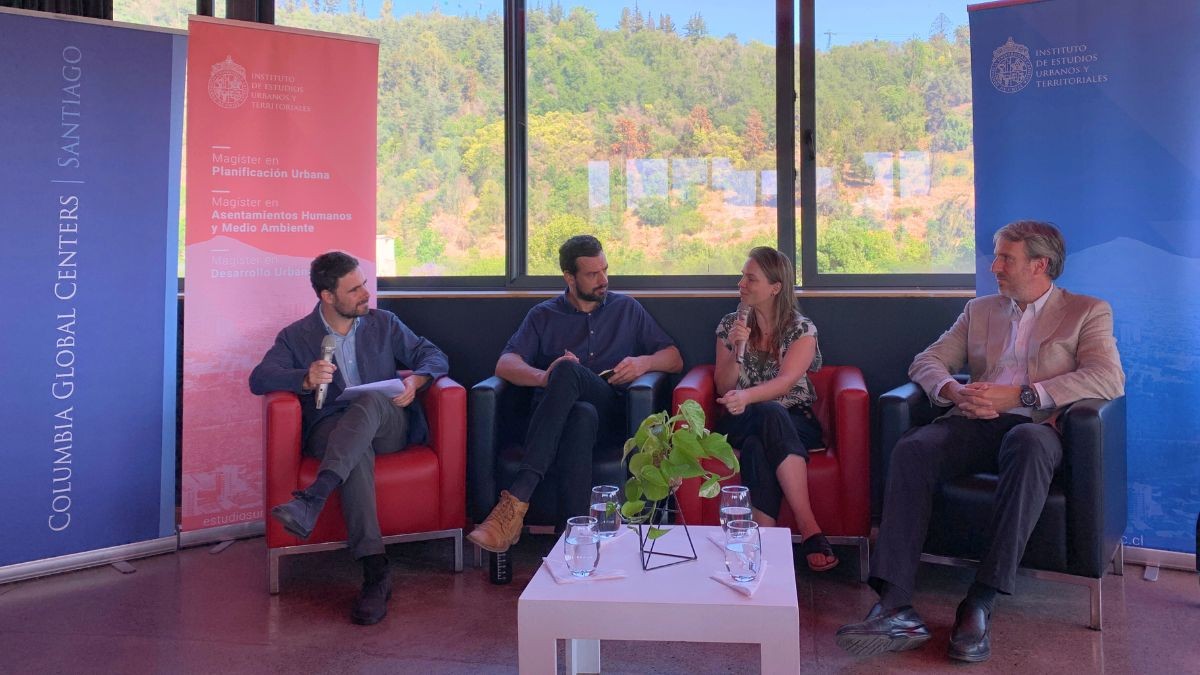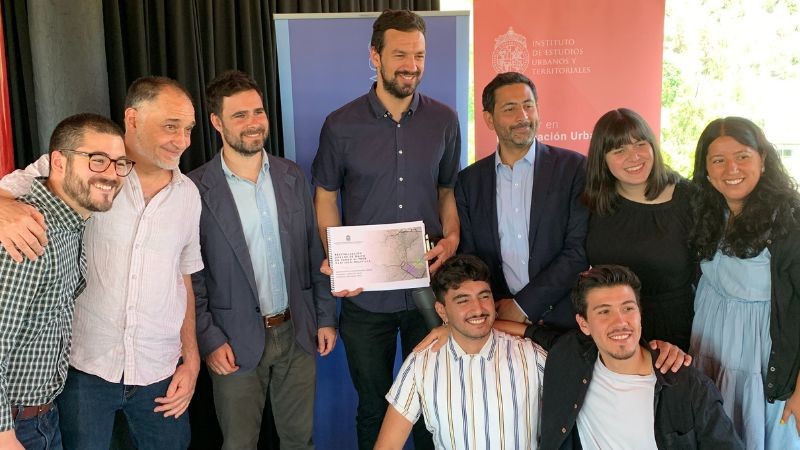Urban Regeneration Series Wraps Up with Maipú Mayor Tomás Vodanovic’s Insights
The session delved into the challenges and opportunities for the sustainable development of Maipú’s neighborhoods.

The culminating event of the Urban Regeneration series, co-sponsored by the Santiago Center, Columbia’s Institute for Latin American Studies (ILAS), Universidad Católica’s (UC) Institute of Urban and Territorial Studies (IEUT), and UC’s Center for Sustainable Urban Development (CEDEUS), unfolded on December 15 at UC’s architecture school.
The seminar began with welcoming words from Luis Fuentes, IEUT director, underscoring the pivotal role of urban regeneration in comprehending cities' development. Organized by Sebastián Salas (GSAPP’22), faculty member at IEUT and former Research Fellow at ILAS, who previously taught the “Urban Regeneration Strategies” course to UC's Master in Urban Regeneration students, the event featured two student groups unveiling innovative urban regeneration projects for the Maipú borough of Santiago. Following the presentations, the groups presented Maipú Mayor Tomás Vodanovic with a comprehensive book encompassing five projects. Ranging from detailed analyses to tangible solutions, the book serves as a roadmap for the municipality's future urban development decisions.
Following these presentations, a panel, moderated by Salas, delved into the challenges and opportunities tied to public investment, and the pursuit of inclusive, attractive, and sustainable development for Maipú’s neighborhoods—especially in relation to transportation and mobility.
The seminar featured Mayor Tomás Vodanovic, Patricio Rey, CEO of Desarrollo País—a state-owned company focusing on long-term infrastructure projects—and Catalina Harrison, Program Coordinator of the Eje Alameda-Providencia Project. This initiative aims to rejuvenate and enhance public spaces, transforming the primary corridor of the Chilean capital, endorsed by a public cooperation agreement between the central government, the Metropolitan Regional Government, and the municipalities of Estación Central, Lo Prado, Providencia, and Santiago.
Vodanovic expressed gratitude to UC and the Santiago Center for their collaborative efforts with the Municipality of Maipú. He stressed the need for a city government capable of holistic project thinking, acknowledging the transformative efforts of the current metropolitan government led by Governor Claudio Orrego. Discussing Maipú, Vodanovic highlighted its past lack of a profound urban development perspective, resulting in a shift towards a service-provider municipality, evident in the perceived neglect and destruction of public spaces.
Vodanovic emphasized the critical role of the private sector in Maipú’s development, asserting that the borough’s trajectory over the next 12 years hinges significantly on attracting private investment. Citing examples like the mismanagement of the municipal water service, SMAPA, he underscored the need for timely public investment to create an environment conducive to private investment.
Balancing long-term development plans with immediate citizen needs was another key theme in Vodanovic's address, recognizing the importance of both aspects for securing popular support: “If our vision extends only to designing, dreaming, and planning for the next 12 years, come the reelection next year, the people will likely show us the door. On the flip side, if our sole emphasis is on delivering fast positive outcomes without building for the future, we might secure a reelection or two but leave behind a city not significantly improved from what we inherited.”
Catalina Harrison shared her experience with the Eje Alameda-Providencia project and the lessons that could be useful for Maipú's urban regeneration needs. She highlighted the challenges of bringing various stakeholders to the table for agreements and stressed the continuous and collaborative work of each institution involved in the success of the project she is involved in. She emphasized that in urban regeneration, it is crucial to remember that the city is inhabited, even in irregular settlements, and that dealing with people is always complex, especially when relocation is involved, stressing the necessity of considering the minimum possible relocations in regeneration plans.
Later, Patricio Rey addressed the role of companies like Desarrollo País in urban regeneration processes, sharing experiences in overcoming project financing challenges. Rey discussed their collaboration with Metro S.A. for urban improvement projects, aiming to leverage public investment by the State. Inspired by Infrastructure Ontario's model, a Canadian company that started dealing with the state's real estate matters, which in over 25 years successfully transitioned to a system where the Ministry of Public Works in Canada no longer directly executes projects, allowing for it to focus on policymaking and planning. In this respect, Rey highlighted the efficiency of separating project execution from public policy-making: “It makes sense: if you aim to execute and require funding, develop models through a company; and if you want to formulate and implement public policies, the ministry is the place to do it. That's the journey we're on,” he closed.
In his closing statements, Vodanovic urged students and professionals passionate about city-related issues, urban planning, and urbanism to explore opportunities in local government. He underscored the profound impact municipalities have on people's lives, expressing that "virtually every aspect of our neighbors' lives is influenced by the quality of municipal management—be it in public education, primary healthcare, security, public spaces, or access to sports and culture." Emphasizing the crucial role of talent in municipalities, he called for more dedicated individuals, acknowledging these institutions as indispensable and formative in the realm of public management.
